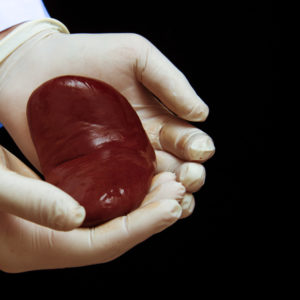Few situations generate more ambivalence than waiting to receive an organ donation. The recipient is desperate for the phone call saying that there is an organ available, but also knows that the call means someone else’s loved one has died — typically a young person and typically unexpectedly.
Almost 115,000 Americans are waiting for life-saving organs to become available. Every ten minutes another person joins the queue and begins the gruesome vigil of waiting for a donor to die. They wait for hearts, lungs, livers, kidneys and other organs. On average, they wait for years.
The time people spend on these waiting lists is largely a function of how few acceptable organs are collected. Fewer than half of Americans have registered as organ donors. But to register as a donor isn’t enough. Only healthy organs, collected under precise conditions, can be used. On average, only three in 1,000 people die in a way that allows their organs to be harvested. The upshot is that about 20 Americans die daily awaiting a transplant. In the case of hearts, lungs and livers, this might be unavoidable.
Kidneys are a different matter. A person needs only one kidney, and most people have two. With so many surplus kidneys, there should be no waiting list at all. The waiting list exists because the government has outlawed kidney sales. But why?
The National Organ Transplant Act of 1984 makes it a crime “for any person to knowingly acquire, receive or otherwise transfer any human organ for valuable consideration for use in human transplantation …”
The Senate Report accompanying the act explains why: “Human body parts should not be viewed as commodities.” The foolishness here is that kidneys are commodities regardless of government pronouncements, and the laws of economics dictate that if you want people to provide more of a commodity, you must offer them a higher price. That the government sets the price of kidneys at zero makes the resulting shortage unsurprising.
Of course, all sorts of people are paid for kidney transplants, from surgeons to anesthesiologists to nurses. The hospital is paid, as are the functionaries who process the paperwork. Even the people who clean the operating room after the transplant are paid. The only person not paid, as a matter of law, is the donor.
In prohibiting the donor from being paid, Congress has decided that the needs of 93,000 people who are undergoing painful and expensive dialysis are less important than the sensibilities of those who don’t approve of others buying and selling body parts.
James Stacey Taylor, editor for the Journal of Medicine and Philosophy, has written about the only example we have of a country that has legalized kidney sales: Iran. Since legalizing kidney sales decades ago, Iran, too, has developed a waiting list. It has a waiting list of people hoping to sell their kidneys. Iran has no waiting list of people in need of kidneys.
There are legitimate concerns around allowing people to sell their kidneys, but we already have examples of markets that deal with each of them. We may be concerned about people being forced to sell their kidneys because of financial considerations. We had similar concerns in venture capital markets and solved them by requiring that participants demonstrate financial health. We may be concerned about transplants being performed in back alleys. We had similar concerns in health care and solved them by requiring that medical professionals be licensed and monitored. We may be concerned about parents selling their children’s kidneys. We had similar concerns with pornography and solved them by throwing people in prison who involved children.
Every meaningful question relevant to kidney markets has been asked and answered. Only one question remains: How many more people must needlessly die before the government allows a kidney market?

